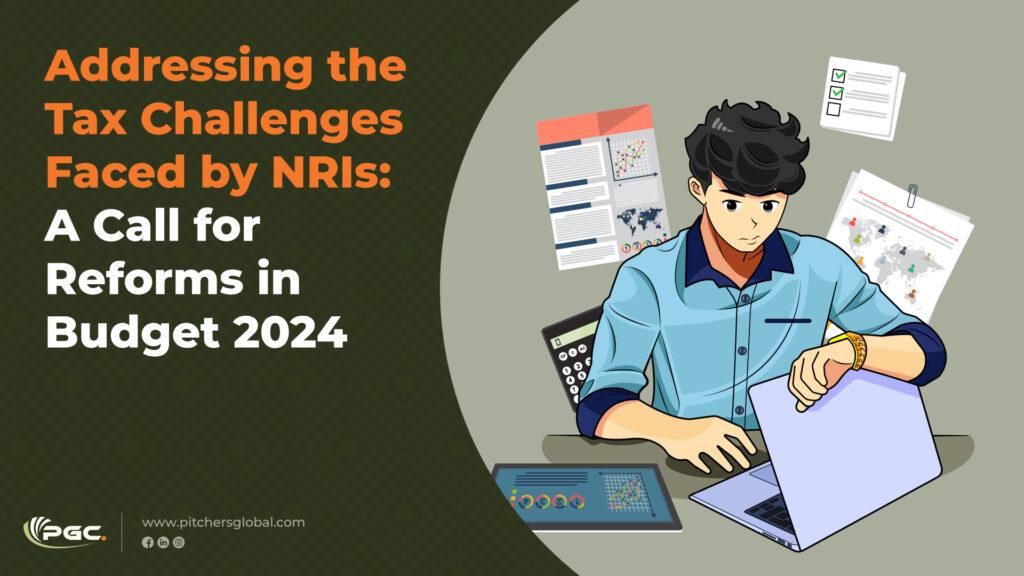India’s tax system is vast and multifaceted, designed to cater to a wide array of taxpayers across different categories. However, for Non-Resident Indians (NRIs), navigating this complex system can be daunting. The tax regime, though comprehensive, often leaves NRIs facing unfair and disproportionate tax burdens, particularly when compared to resident Indians.
As Budget 2024 draws near, now is the perfect time for the government to address these disparities and build a more equitable tax system for NRIs.

Addressing the Tax Challenges Faced by NRIs: A Call for Reforms in Budget 2024
Long-Term Capital Gains (LTCG) Taxation: A Major Disparity
One of the most significant tax issues for NRIs revolves around the taxation of Long-Term Capital Gains (LTCG). This tax applies to the profits made from the sale of assets held for more than a year, such as stocks, bonds, and real estate.
For residents:
LTCG up to ₹2,50,000 (₹3,00,000 under the new personal tax regime) is exempt from tax. This means that a resident earning ₹10,000 in LTCG wouldn’t pay any tax if their total income stays below this threshold.
For NRIs:
Even a modest LTCG amount is fully taxable, which creates an imbalance between residents and non-residents. Furthermore, NRIs face a flat 10% tax on LTCG from unlisted securities or shares of closely held companies, and they do not benefit from indexation (an adjustment of the purchase cost to account for inflation).
Meanwhile, residents are taxed at 20% on LTCG but enjoy the benefit of indexation, which reduces their taxable gains by accounting for inflation, resulting in lower overall taxes.
The problem:
This disparity in the LTCG tax treatment is unfair and places a heavy financial burden on NRIs. The absence of indexation and the flat 10% tax rate means that NRIs are taxed more heavily than residents on similar gains.
Proposed Solutions:
- Extend the basic exemption limit for LTCG to NRIs.
- Provide NRIs with the indexation benefit, which would reduce the taxable gains.
- Harmonize the tax rates and benefits for LTCG between residents and NRIs.
These adjustments would significantly lower the financial burden on NRIs and encourage them to invest more in India’s markets, boosting both foreign investment and economic growth.
Dividend Income Taxation: A Significant Burden for NRIs
Another area where NRIs face challenges is the taxation of dividend income. While dividend income is a key source of passive income for many investors, the tax treatment differs sharply for residents and NRIs.
For residents:
Dividend income below the basic exemption limit is completely tax-free.
For NRIs:
On the other hand, NRIs are taxed at a flat 20% rate on their dividend income, regardless of their total income. This discrepancy results in NRIs paying significantly more tax on the same amount of income than residents.
Additionally, surcharges exacerbate the situation. While residents face a maximum surcharge of 15%, NRIs with taxable income above ₹5 crore are subject to surcharges as high as 37% (or 25% under the new personal tax regime).
The problem:
NRIs are unfairly burdened by a flat 20% tax rate on dividends, while residents enjoy more favorable tax treatment. The surcharge rate, which can go as high as 37% for NRIs, further increases the financial strain.
Proposed Solutions:
- Introduce a slab-based tax system for NRIs on dividend income, similar to that for residents.
- Cap the surcharge for NRIs at 15%, aligning it with the surcharge on residents.
These changes would ensure that NRIs are taxed fairly on their dividend income, in line with the tax treatment for residents. This would also help incentivize NRIs to invest more in Indian companies, contributing to the growth of the Indian stock market.
The Need for Reforms: Promoting Fairness and Investment
India’s tax system, although designed to be comprehensive, currently penalizes NRIs in ways that discourage them from investing in the country. The unequal treatment of NRIs in terms of LTCG and dividend taxation puts them at a disadvantage, ultimately leading to missed opportunities for India to benefit from NRI investments.
As Budget 2024 approaches, the government has a unique opportunity to address these challenges and create a tax system that is more equitable for both residents and NRIs. By aligning tax rates, providing relief through indexation, and introducing a fairer taxation system for dividend income, the government can reduce the financial strain on NRIs and encourage them to invest in India’s economy.
Such reforms would not only foster fairness and transparency in the tax system but also help increase foreign capital inflows. This would lead to greater economic development and create a more inclusive financial ecosystem where NRIs feel valued and incentivized to contribute to India’s growth story.
Tax Challenges for NRIs – Conclusion
The tax system in India needs to evolve to reflect the changing global economic landscape. For NRIs, the current tax framework often feels discriminatory, with higher tax burdens on LTCG and dividend income compared to their resident counterparts. The upcoming Budget 2024 presents an ideal opportunity to correct these disparities, making the tax system fairer and more attractive for NRIs.
By addressing these key issues—extending LTCG exemptions, offering indexation benefits, and adjusting the tax on dividends and surcharges—the government can create a more conducive environment for NRI investment. This, in turn, will help foster greater economic growth, benefiting both India and the global Indian diaspora.
If the government takes these steps, it could see a significant boost in NRI participation in India’s economic future, benefiting everyone involved. Let’s hope Budget 2024 brings the changes that will lead to a more fair and inclusive tax system for all.
Pitchers Global minimises tax challenges with tailored solutions for NRIs!
